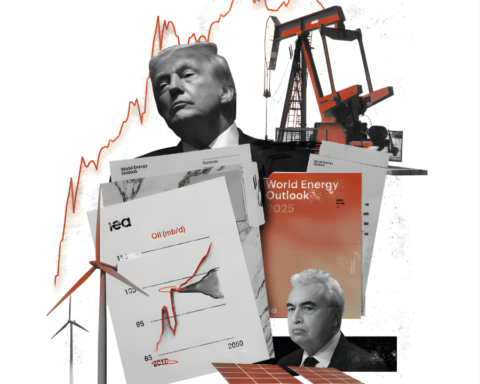May was a rough month for oil companies. It started when the agency that was created to defend fossil-fuel security made a game-changing proclamation: that winning the fight against climate change means no more oil, gas or coal deposits should be developed beyond projects already committed as of 2021. “There is no need for investment in new fossil fuel supply in our net zero pathway,” the International Energy Agency’s landmark report declared in late May.
To limit the long-term rise in global temperatures to 1.5°C, it said governments and industry must wean themselves off fossil fuels ASAP, push for energy efficiency in all walks of life, and invest trillions in renewable energy.
Coming from the Paris-based IEA, an intergovernmental body founded in the wake of the 1973/74 OPEC oil embargo to assure global energy supply, the report turned heads. Overseen by the energy ministers of 30 major economies, the IEA has generally defended fossil-fuel interests. But with most countries missing their emission-reduction targets and catastrophe looming, the IEA finally picked a side.
“This gap between rhetoric and action needs to close,” said IEA executive director Fatih Birol. “Doing so requires nothing short of a total transformation of the energy systems that underpin our economies.”
Nine days later, on May 26, calls to close that gap came fast and furious. Chevron shareholders voted 61% in favour of an activist proposal asking the oil company to cut its total greenhouse gas emissions, including those coming out of customers’ tailpipes, emissions known as Scope 3.
That same day, at least two ExxonMobil board members were unseated in a bid to, as Reuters put it, “force the company’s leadership to reckon with the risk of failing to adjust its business strategy to match global efforts to combat climate change.”
Eli Kasargod-Staub, the executive director of Majority Action, a shareholder group, told The Guardian, “For the first time in history, responsible shareholders have breached the walls protecting recalcitrant boards of directors.”
Also that day, a Dutch court ordered Shell to reduce its GHGs by 45% by 2030, based on 2019 levels, after determining that Shell’s climate plans were inadequate. Pundits began calling it Black Wednesday and ‘a day of reckoning’ for Big Oil as courtrooms and boardrooms turned on industry.
“For the first time in history, responsible shareholders have breached the walls protecting recalcitrant boards of directors.”
-Eli Kasargod-Staub, executive director of Majority Action
“This is a monumental victory for our planet, for our children and a big leap towards a livable future for everyone,” said Donald Pols, director of Friends of the Earth Netherlands.
Though Royal Dutch Shell said it will appeal the ruling, more good news was announced May 26: Canada’s largest oil company, Suncor, committed to going net-zero by 2050, adding it would slash emissions across its value chain by a third by 2030.
Luckily, the IEA’s report, Net Zero by 2050, “shows that there are still pathways to reach net-zero by 2050,” said Birol. He called the IEA’s prescribed course “the most technically feasible, cost‐effective and socially acceptable. Even so, that pathway remains narrow and extremely challenging, requiring all stakeholders – governments, businesses, investors and citizens – to take action this year and every year after.”
The report sets out 400 milestones necessary to achieve net-zero by 2050. Most important: ensuring that developing economies receive financing and technological aid to build their energy systems equitably and sustainably. Birol insists that a world powered by clean electricity means huge opportunities, “with the potential to create millions of new jobs and boost economic growth.”
“Big Oil and Gas has just lost a very powerful shield,” summed up David Tong, a senior campaigner with Washington, D.C.’s Oil Change International.
But the IEA’s shift doesn’t mean the path to 2050 will be smooth. The Canadian Association of Petroleum Producers dismissed the report as “unrealistic.” Alberta Energy Minister Sonya Savage predicted Alberta’s fossil-fuel sector “will continue to grow and thrive.” Large emitting countries such as Japan, Australia and the Philippines bucked the proposed ban on new development, claiming natural gas, oil and in some cases even coal still have roles to play.
It doesn’t help that the IEA has been sending out mixed messages. Weeks after the release, as OilPrice.com pointed out, “the agency called on OPEC+ to increase production as demand for oil rebounded faster and stronger than the agency had apparently expected.” By July, benchmark crude oil prices had surged to multi-year highs after a breakdown in negotiations with the Organization of the Petroleum Exporting Countries.
In its July oil market report, the IEA cautioned that “while prices at these levels could increase the pace of electrification of the transport sector and help accelerate energy transitions, they could also put a drag on the economic recovery.” It added, “Volatility does not help ensure orderly and secure energy transitions.”
Meanwhile, back in Canada, oil industry advocates continue to suggest that the sector should be positioning itself to capitalize on the next oil boom. However, in a report released last month, Jeffrey Craig of Veritas Investment Research said, “Given the pressure to both cut emissions and invest in renewable energy, we expect the super majors to shed mostly upstream oil and gas assets [in the oil sands] to fund investments into renewables.”
Right on cue, when BP slashed its long-term oil price outlook in late June, the company’s oil sands investments were rendered “worthless,” Reuters reports. The fate of those stranded assets remains to be seen.
South of the border, oil majors are feeling the heat this week as Democratic senators proposed a climate pollution tax that could cost Exxon, Chevron and other big emitters billions annually while establishing a “Polluters Pay Climate Fund.” The draft bill could see US$500 billion raised over 10 years to be used toward investments in communities facing fossil-fuel-driven climate impacts, including extreme flooding, rising sea levels and a more severe wildfire season.
Corporate Knights director of research Ralph Torrie points out that “the smart money and long-game investors” have been pivoting from fossils to renewables for years. “If the IEA can get out in front of that parade, it can only help.” Torrie suggests that the right question to be asking is not “What will happen?” but “What must happen?” if we are to avert truly dangerous climate change.
While new technologies may help power the transition, he credits the agency for seeing energy efficiency as a resource: “We must thread the eye of a needle here, and there is only time now for one attempt at it.”
A version of this story appeared in the Summer Issue of Corporate Knights magazine.







